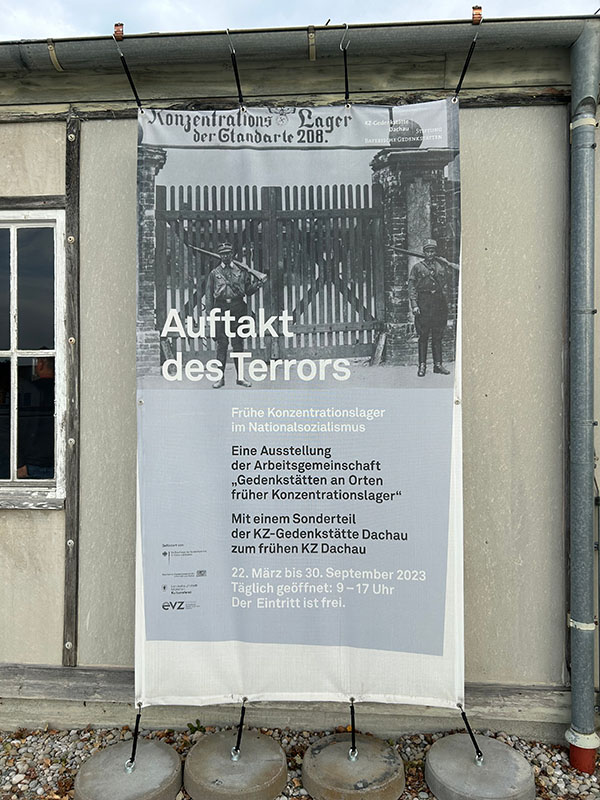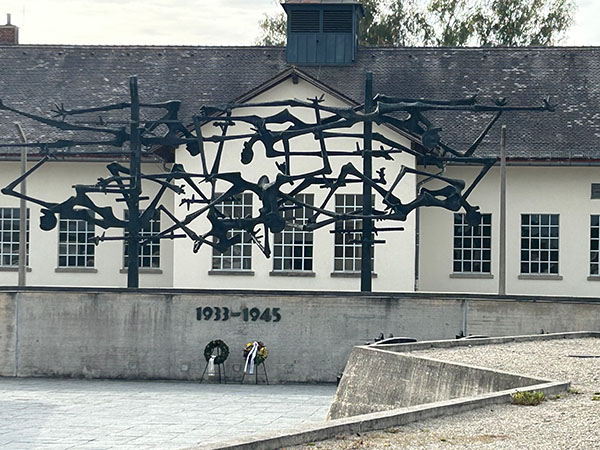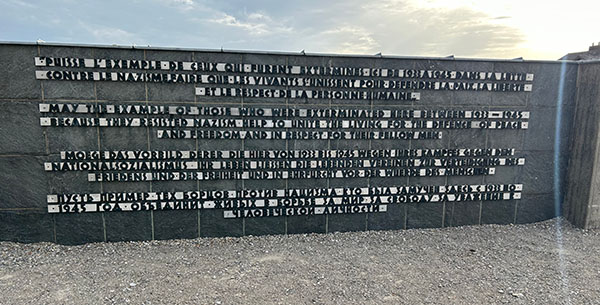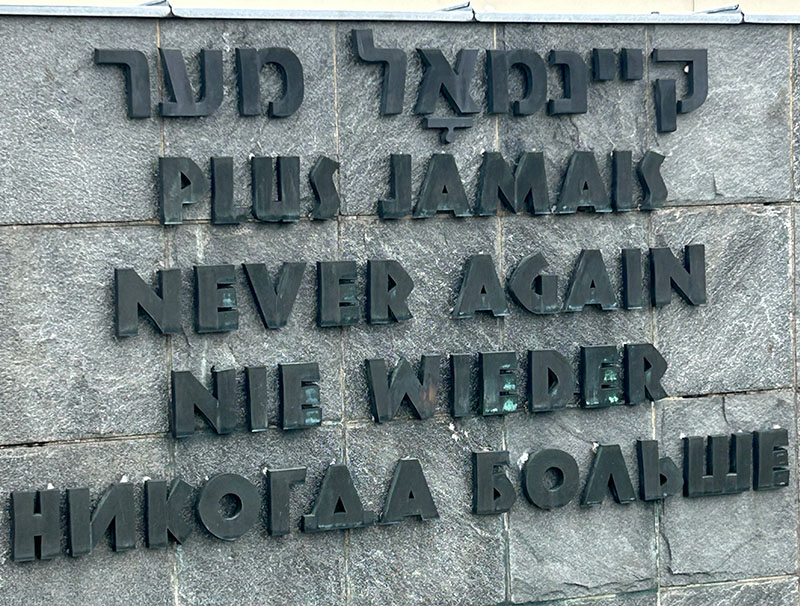When my wife and I traveled recently through Germany, we were surprised that our most powerful experiences came from something other than the country’s iconic tourist attractions.
Certainly, the traditional sites—the scenic Rhine River guarded by 12th Century castles, the walled medieval city of Rothenburg, dreamy Neuschwanstein Castle (which inspired Disney’s Cinderella’s castle), Munich’s festive Hofbrauhaus, and much more—were appealing attractions.
But the most powerful experiences were triggered by the sites and stories that bore witness to the tragedies that Hitler and the Nazis unleashed more than 75 years ago.
Visiting memorials in Berlin (including for the Jewish holocaust, for the “Gypsies,” and for people with mental and physical disabilities) . . . seeing the conference rooms and documents at the Wannsee villa where high-ranking Nazis planned the details of the “final solution to the Jewish question” that called for the murders of all Jews in German-controlled territories . . . hearing while outside of the crematoriums at Dachau Concentration Camp that we were standing on ground constructed from the ashes of thousands of prisoners killed at the camp . . . these were disturbing experiences.

Berlin’s Memorial to the Murdered Jews of Europe
While uncomfortable, these experiences are also important. They echo the tragedies across the decades and inform us about the deadliest period for human well-being in history.
But they also provide warning signs to the contemporary threats of our own era, and suggest how we might turn from danger and still live well, collectively and individually.
Bearing Witness to the Past
World War II was the most destructive war in human history. In addition to the devastation to entire cities and widespread economic destruction, the war led to the deaths of somewhere between 50 million and 70 million people, according to estimates. This huge loss of life, which exceeded the estimated death tolls from all previous wars combined, is horrific. Especially tragic were the Nazi murders of millions of people during their reign, including:
- About 6 million Jewish people
- Roughly 500,000 Roma and Sinta people (formerly called “Gypsies,” an older term that is now considered racially insensitive)
- About 300,000 people with mental and physical disabilities
- Thousands of gay and lesbian people
- Thousands of political opponents

How Could This Have Happened?
The genocide and rampant killing of millions of people seems unfathomable. Like other people visiting the German memorials and concentration camp, we asked ourselves the question: How could this have happened?
The driving force behind these atrocities was of course Hitler and the Nazis. Still, that begs the question: how did Hitler and the Nazis come to yield such power? Many other works have described the causes in detail. The factors are multiple but here are some of the most critical factors:
- After losing World War I, and also being forced to pay huge reparations for this war, the German people felt disgraced, angry, and demoralized. Economic problems, especially after the start of the Great Depression in 1929, were severe. The democratic governments of this time were fraught with fractious party conflicts that led to ineffective governance.
- Hitler was a charismatic (if evil) figure who built a cult-like following, in part by offering simple slogans at rallies that promised easy solutions to complex problems. In particular, he advanced conspiracy theories—must notably that the German people lost World War I because they were sold out by Jewish citizens.
- Hitler and the Nazis were masters of lies and propaganda. His speeches at mass rallies of adoring fans and his propaganda in print, radio, and film were rife with lies and conspiracy theories that inflamed fear and hatred, especially toward Jews as well as other minorities and those who opposed him. Hitler and his supporters repeated lies and conspiracies over and over until they seemed like the truth to many.
- Hitler promised the German people that he could restore the country to glory and greatness. In essence, he vowed to make Germany great again, a promise that appealed to many Germans who felt a sense of a newly-stoked sense of grievance and anger over the current conditions.

- Many Germans wanted to believe Hitler’s seductive promises. A lack of critical thinking among the population (which was not well-educated at the time), wishful thinking, fear, national pride, and a degree of complacency and of simply just going along with the Nazis for the promised benefits were factors that contributed to his rise to power.
- A central component of Hitler’s plan to return Germany to greatness was to rid it of non-Aryan people, especially the Jews and other minorities. He considered these minorities as subhuman.
- Sadly, Hitler initially came to power in part through democratic practices, including a national election, although he never received a majority of the popular vote. In 1932, he received about 35% of the vote but lost the presidency to Hindenburg. Still, Hitler demanded Hindenburg appoint him as chancellor, which Hindenburg did in 1933 after Hitler gained additional political support from the conservative establishment (who mistakenly believed they could control Hitler or that he would become more reasonable after obtaining power).
- Once in the position of chancellor, Hitler consolidated his power. He used the police, the SS, and other Nazi groups to threaten and intimidate—as well as to imprison, torture, and murder—opponents. Hitler, a paranoid and narcissistic figure, demanded absolute loyalty and attacked those who did not fully support him.

Sculpture Memorial at Dachau Concentration Camp
- He suppressed voting by non-Nazis and repressed perspectives that did not align with Nazi ideology, including by attacking the press and book banning.
- Hitler took advantage of political crises (especially arson at the national legislative building) and made promises of security to an opposing party (which he later failed to keep) to gain passage of legislation giving him the power to rule by decree instead of law.
- After President Hindenburg died in 1934, Hitler declared himself as the Fuhrer and formalized the dictatorial powers he had gained over the past 18 months.
Never Again—Can We Ensure that?
Fortunately, Hitler’s Third Reich lasted 12 years, not the 1,000 years he promised. His defeat is attributable to the sacrifices and effort of America and its Allies in World War II (in combination with the mistakes that Hitler—a grandiose megalomaniac—made in his war strategies).

Like millions of other people, I hope we will never again see a dictator like Hitler or a government controlled by fascists like the Nazis.
Toward this end, many have vowed “Never Again”—a term used most specifically to commit to preventing another Holocaust of Jews from ever occurring again.
More broadly, Never Again is also concept that makes a commitment a) against all genocide and b) against dictatorships and instead supporting democracies and human rights.
We should all make a commitment to Never Again in all of its meanings.

Frankfurt Memorial Wall to 11,908 Jews from the city killed in the Holocaust
But can we be sure that the world will indeed never again live through such horrors, including in the broadest meaning that stands against oppressive authoritarian leaders, the destruction of democracies, and governmental attacks on human rights?
Troubling Echoes
To paraphrase Mark Twain, history doesn’t repeat itself but it echoes in rhythmic verses.
And if we listen carefully, we can hear echoes, not as terrible but nonetheless disturbing, across the world today.
Do you recognize any troubling warning signs?
One of the clearest examples for me is Vladimir Putin who manipulated Russian democracy into a dictatorship while abusing the human rights of citizens and waging war and destruction on independent countries. Other countries across the world have also slipped into autocratic and authoritarian regimes.
Closer to home, there have been—and are—many troubling events that signal threats to democracy, human rights, and well-being.
Let me be clear at the outset: I am not saying any American politician is the evil individual that Hitler was.
But let’s also be clear that democracies and dictatorial-authoritarian governments exist on a continuum rather than in black-and-white terms.
And so too there is a continuum of societies that value human rights and well-being versus those that dehumanize, abuse, and oppress people (especially minorities).
We need to be vigilant to stop movement—even in its less terrible forms—away from democracy, human rights, and well-being.
To do so, we should bear witness to the reality of disturbing events. We must not be fooled by political lies, conspiracy theories, disinformation, and manipulation of the public. We must recognize the early warning signs that history has taught us that can lead to the destruction of democracies, human rights, and the well-being of citizens.

Dachau memorial wall with inscription: “May the example of those who were exterminated here between 1933 and 1945 because they resisted Nazism help to unite the living for the defence of peace and freedom and in respect for their fellow men.”
Toward this end, here are some recent facts that echo the rise of autocratic power and the destruction of democracy in history:
- The prior President used the power of his and other governmental offices to spread false conspiracy theories and the lie that the 2020 election was stolen from him, even in the face of extensive factual evidence to the contrary, scores of court decisions reviewing his claims (including by judges he appointed), and reports by some of his most trusted advisors.
- The former President attempted to pressure multiple government officials to defy their oath to the U.S. Constitution and manipulate the count of electoral votes in order to keep him in office for another term. Sadly, some of these officials were willing to do so, although fortunately they were not successful.
- The former President incited a violent but unsuccessful insurrection against the U.S. Government in another attempt to stop the electoral count and the peaceful transfer of power to the newly elected President.
- The former President continues even now to lie and spread false conspiracies about the past election (and other events) as he seeks to return to the Presidency after the next election.
- The former President repeatedly threatens and tries to intimidate his political opponents and even government judges, court staff, and lawyers who attempt to hold him accountable for his multiple alleged crimes. (Among his most offensive actions are a) his posting an image of himself holding a baseball bat, cocked and ready to swing, behind the head of a (black) prosecuting attorney whom he called “an animal,” and b) his suggesting execution was warranted for his former Chairman of the Joint Chiefs of Staff, a highly decorated military professional (who (a) with the approval of the Secretary of Defense, called China to ease the threat of world war with during the chaotic final weeks of the former administration, and (b) no longer supports the former President).
Sadly, a sizable minority of the population continue to believe the lies and support the former president. This includes many good people and fervent patriots who are frustrated by current conditions, supportive of conservative politics, and charmed by his charismatic style—and who are often deceived by his lies, false social media posts, and the inaccurate “news” from biased cable network channels that seek to optimize their ratings and profits. Meanwhile, a smaller core group of political extremists knowingly support his lies and unethical behavior to curry his favor and advance their own power and ideology.
Unfortunately, however, actions detrimental to democracy and human decency go beyond a single politician. Examples of other egregious actions include:
- Multiple states have worked to gerrymander voting districts to ensure single party control and sought to suppress voting, especially of racial minorities, who tend to vote for a different party.
- Another current Presidential candidate, the governor of a populous state, has prohibited history classes that confront racism, even as he said that some blacks benefited from slavery because they learned skills. (This is in stark contrast to Germany, which at least since the 1960s, acted to openly acknowledge and educate its citizens about its past atrocities as a way to help prevent their reoccurrence.)
- Multiple states have enacted legislation to discriminate against minority groups and also banned books—including, ironically, The Diary of Anne Frank, which told the story of a young Jewish girl who died during the Nazi Holocaust.

Political Considerations
I am not saying the former President is another Hitler. He is not. Nor are his closest followers Nazis—they are not.
I am saying that they have engaged—and continue to engage—in multiple actions that seriously threaten democracy, human rights, and human well-being.
My point is to not to attack Republicans, either. American history is rich with the contributions of Republicans. Today the country has benefited from the work of many Republicans, including Liz Cheney, Mitt Romney, Adam Kinzinger, and Cassidy Hutchinson.
The United States needs ideas, discussion, and cooperative work from Republicans, Democrats and Independents, as well as smaller political parties. Our republic needs a multiparty system to help ensure democracy.
But most of all, it needs a commitment to democracy and human decency.
Ensuring Never Again
So, how do we ensure we will never again see the likes of the Nazis in power, genocide, the destruction of democracy for an autocratic leader, and the widespread governmental intimidation and even violence toward its citizens?
The topic is complex and multiple social and political strategies are necessary.
But a simple first step forward is to center upon the goals and practices of human happiness and well-being.
A perspective of well-being goes far beyond concern with only the personal interest of individuals.
The practice of living well and being happy also recognizes that we live within social (and physical) ecosystems.
We affect others, just as they affect us.
We co-create the social order and the world by our values, choices, and actions.
Further, a similar set of core values that facilitate individual happiness can be extended toward all people—and, in so doing, help to ensure human rights and well-being while helping to prevent antidemocratic governments, oppression, and attacks on individuals.
Some of these values are incredibly basic:
- Recognize the inherent human worth of every individual and minority group. No one is subhuman.
- A helpful practice is not only to recognize the worth of every person, but to actually look for and see the strengths, the good, and even the divine within everyone. To paraphrase Mother Teresa, we should learn to see the divine in everyone, including in its most distressing disguises.
- Consider everyone with respect—including by listening to different perspectives, which can deepen understanding and identify possible common ground.
- Treat everyone with large doses of compassion and kindness.
- Even more, we can treat others with love, not hatred. The guide that lead us on the tour of Dachau, a Nazi concentration camp replete with atrocities and murders, wore a neck strap that repeated the word, “Love.” One can imagine that if the citizens of Germany in the 1930s and 1940s had acted with love, none of the concentration or death camps would have existed and millions of deaths would have been prevented.
- Bear witness. We all get busy, preoccupied with the details of our personal activities, and have often been socialized to “stay in our lane” and avoid politics, especially controversial issues. But we can stay aware—with clear eyes, open minds, and caring hearts—and see the social-political truths—even the unpleasant and destructive ones—that are occurring in the country and the world.
And seeing these truths, we should speak out against them and for respect, compassion, justice, and love.
Further, we can act consistent with these values, instead of being complacent, which unwittingly leads to complicity.
We can vote and engage in a range of other social political behaviors, to support democratic and humanistic values and to oppose movements based on hatred, personal autocratic power, and anti-democratic behaviors.
These few basic values and actions are simple. Clearly, additional actions are also needed.
But these are first steps to ensuring Never Again.



Follow Me: